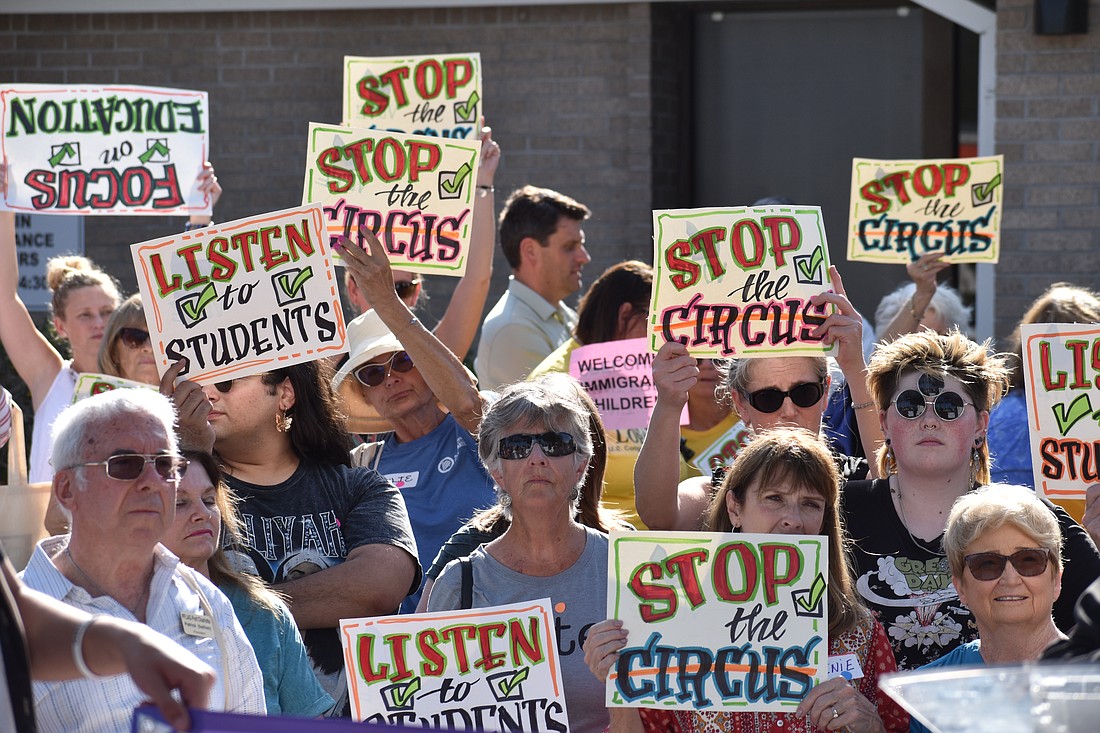- March 6, 2025
-
-
Loading

Loading

The voices of the public once again dominated the Sarasota County School Board meeting on April 2, and most speakers said they were there to help ensure the situation stays that way.
While once again calling on board member Bridget Ziegler to resign, speakers also turned their attention to discussions during a March 19 board workshop, which saw board members considering options for limiting public comment.
During those discussions, the board noted that as a limited public forum, it is legally allowed to set certain restrictions.
Speakers on April 2 emphasized concerns that the board was not considering their input and seeking to restrict viewpoints it did not favor, while many speakers also invoked the First Amendment.
“If you want shorter meetings, you should consider the concerns of the public, and vote accordingly,” said former teacher Christy Karwatt. “Many community speakers spend hours researching the issues at hand, and provide valuable information, which you don’t even consider before casting your votes.”
A rally titled "Stop the Circus" was held outside the building of the school board chambers in the hour prior to the meeting.
Organized by The Social Equity through Education (SEE) Alliance, it involved members of PEN America Florida, Support Our Schools, Project Pride SRQ, Voices of Florida, Church of the Trinity MCC and Equality Florida.
Documentary crews were also present filming the rally, and inside the board chambers.
Of the proposed restrictions considered by board members, the first option outlined existing rules within Florida statue for regulating comments, including disruptive speech.
The second option would determine public comment based on the number of speakers, through individual time limits as short as one minute, and the third would set an overall limit of 90 minutes, with an evenly divided time not to exceed three minutes. The fourth would split public comment into two portions, with agenda items at the start of the meeting and general comments at the end, with time limits based on the number of speakers, who would be able to speak in both sessions.
"I want it clear that in no way do I want to restrict anybody's freedom of speech," board member Robyn Marinelli said on March 19. "That is a given... so how do we run a productive meeting because I know that people in the community, regardless of their political views, they want to see a board that works well, and they want to see what's going on in the board rooms to stop, and focus on education and the needs of our students and our staff..."
Ziegler and Marinelli, and Chair Karen Rose favored the third option, while board member Tom Edwards favored the fourth option, saying he thought a similar policy repealed by the board “worked beautifully."
He suggested allowing three minutes whether speaking on an agenda or a non-agenda item, and opposed limits on the length of the period for public comment.
Board member Tim Enos raised the idea of three minutes per agenda items and 90 minutes of public comment at the end of the meeting.
The board also requested further information on options regarding the use of signs by audience members.
The previously imposed restrictions to which Edwards referred had been passed in 2021, at a time that saw numerous speakers addressing the board on issues such as COVID-19 and Critical Race Theory.
Most public commenters on April 2 vehemently opposed implementing the new measures.
“It is terrible, demoralizing and a time-waster listening to community members hour after hour, meeting after meeting, year after year, when there’s so much work that needs to be done making an ever-better public education system,” said Louise Machinist. “But as others have already said, the proposed shortening of public comment really misses the point, and the real point is, make real change.”
Commenters called on the board to consider their feedback on other issues. Many mentioned the Parental Rights in Education Act, also known as the Don't Say Gay bill, asking the board to repeal certain measures related to the bill, which was partially rolled back in March.
"We need the superintendent and the school board to take leadership on this, specifically for limiting the outing policy, encouraging teachers to uncover their bookshelves, and encourage librarians to bring diverse books back into the schools, and create a comprehensive inclusion policy for the district, similar to Hillsborough County," said Richard Stammer.
Englewood GOP activist Conni Brunni was one of the few to speak in favor of the board's actions, commending the board for considering the measures and criticizing those who spoke in opposition. She highlighted that the proposed restrictions would allow some commenters to speak twice in the meeting.
"What's funny, again, is that it's possible under a couple of these potential opportunities that folks would get not once but twice to speak," she said. "They get more time. Not less. Not less."